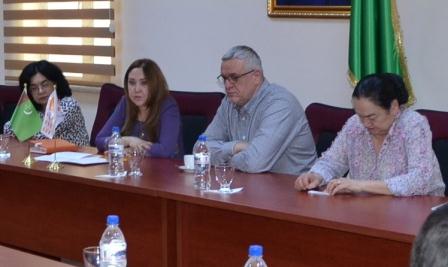ASHGABAT – UNFPA, United Nations Population Fund supported the Ministry of Health and Medical Industry in finalization of nine clinical protocols on neonatal resuscitation and conducting the training of trainers (TOT) among the field medical nurses and obstetricians on neonatal intensive care and use of modern technologies.

Neonatal resuscitation is the intensive care provided to the newborn babies to help them breathe and to help its heart beat. Neonatal resuscitation skills are essential for all health care providers who are involved in the delivery of newborns.
Why is it important to have clinical standards for neonatal intensive care?
Clinical standards are needed because although the need for neonatal resuscitation can often be anticipated, on many occasions it is unexpected.
Globally, the transition from fetus to newborn requires intervention by a skilled individual or team in approximately 10% of all deliveries. Nearly one half of newborn deaths (many of which involve extremely premature infants) occur during the first 24 hours after birth.
Health care institutions have a duty of care to provide an effective resuscitation service and to ensure that their medical staff is educated to recognize and respond to acute deterioration.
This institutional responsibility includes the provision of related education, the allocation of human and material resources to support provision of resuscitation services, a process for evaluation of the quality of resuscitation and its improvement. The education should enable individual staff to develop and maintain a level of competence commensurate with their roles within their healthcare setting.
Timely and effective recognition and treatment of those whose condition is deteriorating is important for positive patient outcomes.
Setting up standards for clinical care in Turkmenistan
“Development of nine protocols by the National working group on neonatal resuscitation is the initial step in quality improvement of neonatal healthcare services,” said Kemal Goshliyev, UNFPA National Programme Officer on Reproductive Health. “Proper implementation of the clinical protocols will be ensured by the national monitoring group, as well as internal self-assessment with use of monitoring indicators for each protocol.”
The clinical protocols include such sections as identification of the need for intensive care at birth, as there is an established list of health circumstances that can increase the risk of the newborn needing a resuscitation at birth; communication and information sharing, since preparation for a high risk birth requires effective communication and information sharing and a consistent and coordinated approach between nurses, obstetric and neonatal clinicians; availability of equipment, as a complete set of resuscitation equipment and drugs should always be readily available in the areas of hospitals where newborns are born or receive neonatal care; among others.
Upon finalization of the clinical protocols by the National working group of the Ministry, twenty three medical specialists were certified in effective neonatal nursing and medical care. The Ministry plans that the master trainers will conduct cascade trainings country-wide on implementation of the clinical protocols on neonatal intensive care.
UNFPA supports the Ministry of Health and Medical Industry of Turkmenistan and health care system in improving the quality of maternal and newborn services. Last year, the government endorsed the National Strategy on Improvement of Maternal, Newborn, Adolescent and Child health for 2015-2019, developed with joint support of UNFPA, UNICEF and WHO. The improvement of perinatal services (Order #166) and specifically neonatal healthcare services is an important focus area of the Strategy.
***
UNFPA: Delivering the world where every pregnancy is wanted, every childbirth is safe, and every young person’s potential is fulfilled.
For additional information, please contact:
Kemal Goshliyev, Reproductive Health NPO
Ene Tuyliyeva, Advocacy Communication Associate
Tel: 425250
Web: www.unfpa.org.tm

